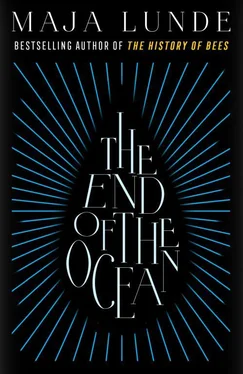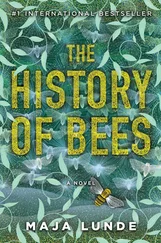The fog lifts, the Ì hold of the line to unfurl the headsail, but something—a disturbance in the water—causes me to stop. The surface remains unbroken, but nonetheless there is something down there, far below me.
A sound, a loud sound, of rushing air; I whirl quickly around towards the port side and there it is: about fifty meters away from the boat, a tall geyser is rising out of the water. The whale sings, has its own language, but the song can’t be heard up here, only this strange, almost mechanical sound of water gushing out of its blowhole.
The bluish-black back draws closer, glides towards the boat; it’s long, God, so long, maybe twenty meters, twice as long as Blue , a finback whale, it must be a finback whale. The second largest species on earth after the blue whale, found in all waters. I’ve seen whales before, but never one so large, never at such close range.
The body is an arc on the surface until it slides underwater again and is swallowed by darkness.
Where are you, where are you? Disappear now, swim calmly away from here.
But then it returns, just a few meters away from me, swimming alongside the boat. It must be a female, they grow the largest, maybe fifty tons, maybe sixty, compared to the Arietta’s meager 3.5 tons. A single flick of its enormous body and Blue will be destroyed, a mere flick and there’s nothing I can do, it’s so huge, so heavy, it can hurt me if it wants, hurt the boat, place its back against the hull, capsize Blue, taking me along with it.
How long would I survive in the water, how cold is it? Maybe eight degrees, maybe ten—at ten degrees I would remain conscious for one hour, it would take three hours to freeze to death unless my panic kills me first and I start breathing through my mouth, swallowing water, throwing up, suffocating. Most people who drown are able to swim; it’s the panic that does them in, not the cold water. Or maybe the whale just pulls me under, long before I’ve had time to get cold, tossing me around, playing with me, a heartless game driven by an animal’s incomprehensible impulses, and there is nobody here who can save me.
Again the whale exhales through its blowhole—an intense, loud sound; the column of water is so powerful that I can feel the drops where I’m standing. Should I do something, make noise, maybe that would frighten it? Or agitate it?
I don’t do anything.
It glides underwater but just for a moment, then it’s back once more, only ten meters away now, headed straight for me—it’s going to capsize the boat, I will tumble overboard, it will drag me under, drag me under…
But at that minute it dives away, again it disappears, is centimeters away from making contact with the broadside, as if intentionally, as if it’s playing with the boat and, as if on cue, now it surfaces again starboard. I jump in response to the powerful gush of its breathing.
It swims away from me, but turns, returns to me, glides through the water along the hull of the boat, as if it wants to come up against it, caress the boat, but it never touches it and slowly my fear ebbs away.
Usually they travel in pairs or in groups, in the winter 400 whales were beached in New Zealand, they were beached and couldn’t leave because they waited for each other. The smallest whales could have managed it, at high tide they could have swum away, but they stayed, never abandoned their parents, stayed with the pod, dying with the others instead.
This whale can’t be alone either, it’s bound to have a partner or a child nearby and, anyway, it has the entire ocean beneath it, with all the life it contains, the unimaginable number of species, only I’m alone up here on the surface, only me and the huge surface of the ocean and an infinite emptiness above me. I am a cross on a map, a dot on a surface, insignificant, almost invisible, as we all are, because from a distance, from above, each and every one of us disappears; from outer space it is water one sees, the ocean, the clouds, the drops that give the earth life, the blue globe, different from all the other planets we know about, just as alone in the universe as each and every one of us down here.
You have to stay, dear whale, you have to stay here with me, just stay.
But at that moment it disappears, without warning it’s gone, no ripples on the waves, no bubbles in the water, just the sheer, flat surface is left behind, the enormous, unwieldy floor of water with its incomprehensible system of waves and streams, not impenetrable, but closed all the same.
And the whale doesn’t return.
I’m unable to move, just stand there, feeling the solid deck beneath my feet, how cold my hands are, the lightness of the wind, the humidity in the air.
It’s just me—me and the surface.
There have been periods in my life when I thought I had a pod—Eidesdalen, Alta, Narmada—but actually, there’s only been me, alone, now and always.
I think I’ve been alone ever since the night Daddy blew up the bridge. I think it happened on that night.
They met up there, he and Sønstebø, in the middle of the night, in the dark. I wonder what Daddy was thinking as they attached the sticks of dynamite to the freshly cut timber of the bridge, if he thought about Mommy and about me, or if he just thought about what he had between his hands, the blasting caps, the explosives, about Alfred Nobel who invented dynamite sometime in the nineteenth century—it would be typical of him to think of Nobel… And when they had driven the van away, when they got into position to detonate the charges, did he think of us then, of me? Did Sønstebø think of his child, of Magnus?
Or did the two men think that they were at war, that all’s fair in war, was it a war they were fighting, the two of them, up there on the mountainside that night?
I snitched on Daddy. When I told Mommy about him and Sønstebø that was the beginning of the end. I bore the guilt, I bear the guilt for my own loneliness, I have chosen it myself, am condemned to be free, can’t shirk my responsibility. But it was him, it was the two men who attached the sticks of dynamite to the bridge. That was actually what happened first. I was a chubby little girl with a voice just a bit too loud. I was stuck inside a snow globe and merely did everything I could to escape.
You didn’t know a thing, Magnus, about the bridge, about that night that brought us together. I was alone, you were an interruption in all my years of solitude, but maybe everything would have been different if our fathers hadn’t blown up the bridge. Perhaps the interruption would have lasted longer.
Or maybe we wouldn’t even have found our way to one another. And I would have been without that interruption, without the years we actually had.
Would I rather be without them?
Would I rather be without Magnus?
*
Stop it.
Stop it, Signe.
I have to raise the sail. I take hold of the line again, bend over, and am about to pull when I make a clumsy movement, hitting my knee against the cockpit bench. The pain radiates from my knees, hot shocks in my feet, up along my thighs, through my entire body. I sob; it hurts more and more, and I can only think about the physical pain. For a while that’s all I need to think about.
We could smell the smoke long before we saw the entrance to the camp.
It was so harsh. Familiar. The acrid smell of fire. It had been there all along.
The smell of smoke was something massive that had infiltrated and inhabited me. The stinging in the throat, eyes, the pressure in the chest.
Marguerite started to run. I took Lou by the hand and ran, too.
Читать дальше










